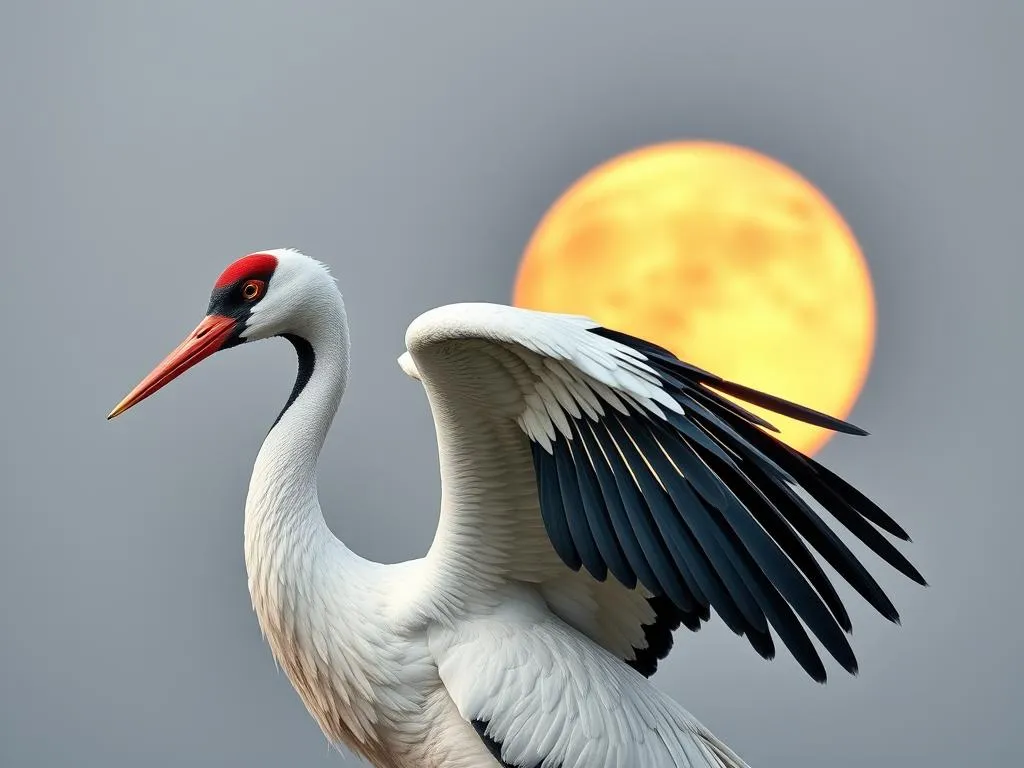The Japanese crane, also known as the Grus japonensis, is a magnificent bird with a rich spiritual significance in many cultures. This graceful creature has captivated the hearts and minds of people around the world, inspiring awe and wonder. In this article, we’ll delve into the Japanese crane spiritual meaning and explore how this bird’s symbolism can enrich our lives.
Introduction
The Japanese crane spiritual meaning is deeply rooted in the cultural and religious traditions of Japan. These birds are revered for their beauty, longevity, and the way they embody the virtues of grace, balance, and harmony. As you read on, you’ll discover how the Japanese crane spiritual meaning can offer insights into your own spiritual journey.
One of the most striking aspects of the Japanese crane spiritual meaning is its connection to the concept of Tsuru, the Japanese word for crane. Tsuru is often associated with good fortune, happiness, and longevity, making the crane a symbol of hope and positivity. Whether you’re seeking to deepen your spiritual practice or simply appreciate the beauty of nature, understanding the Japanese crane spiritual meaning can be a truly enlightening experience.
Key Takeaways
- The Japanese crane spiritual meaning is deeply rooted in the cultural and religious traditions of Japan.
- Cranes are revered for their beauty, longevity, and the way they embody the virtues of grace, balance, and harmony.
- The Japanese crane is often associated with good fortune, happiness, and longevity, making it a symbol of hope and positivity.
- Exploring the Japanese crane spiritual meaning can offer insights into your own spiritual journey and connection to the natural world.
The Symbolism of the Japanese Crane
The Japanese crane spiritual meaning is deeply intertwined with the bird’s physical and behavioral characteristics. These majestic creatures are known for their elegant, long-necked silhouette, their graceful dance-like movements, and their distinctive call that can be heard for miles.
One of the most significant aspects of the Japanese crane spiritual meaning is its connection to longevity and immortality. In Japanese folklore, cranes are believed to live for a thousand years, and they are often depicted as companions to the gods or as messengers between the earthly and spiritual realms. This association with longevity and the divine has made the crane a symbol of wisdom, patience, and the enduring nature of the human spirit.
Moreover, the Japanese crane spiritual meaning is closely tied to the concept of balance and harmony. These birds are known for their ability to maintain a perfect equilibrium, even during their elaborate courtship dances. This quality has made them a symbol of the delicate balance between the physical and spiritual worlds, as well as the importance of finding harmony within one’s own life.
The Cultural and Religious Significance of the Japanese Crane
The Japanese crane spiritual meaning is deeply rooted in the country’s rich cultural and religious traditions. In Shintoism, the indigenous religion of Japan, cranes are revered as Kami, or sacred spirits, and are often depicted in the artwork and architecture of Shinto shrines.
Similarly, in Japanese Buddhism, the crane is associated with the Bodhisattva Avalokiteśvara, the embodiment of compassion. This connection has made the crane a symbol of enlightenment, wisdom, and the ability to overcome suffering.
Beyond their religious significance, cranes have also played a prominent role in Japanese art, literature, and poetry. From the delicate origami figures to the elegant Tsuru designs found in traditional kimonos, the crane has been a source of inspiration and admiration for centuries.
The Healing Power of the Japanese Crane
The Japanese crane spiritual meaning also extends to the realm of healing and well-being. In Japanese culture, the crane is believed to possess the power to heal both physical and emotional wounds.
This belief stems from the crane’s ability to dance and move with such grace and fluidity, which is seen as a reflection of the body’s natural ability to heal and restore balance. Additionally, the crane’s long lifespan and association with longevity have made it a symbol of vitality and resilience.
Many Japanese healing practices, such as Reiki and Shiatsu, incorporate the Japanese crane spiritual meaning into their techniques. Practitioners may use crane imagery or focus on the bird’s qualities of balance and harmony to help their clients achieve a state of physical, emotional, and spiritual well-being.
Connecting with the Japanese Crane
If you’re interested in exploring the Japanese crane spiritual meaning and incorporating it into your own life, there are several ways you can do so. One of the most powerful ways is to spend time observing and connecting with cranes in their natural habitat.
Many nature reserves and wildlife sanctuaries in Japan offer opportunities to witness these magnificent birds up close, and to observe their graceful movements and distinctive vocalizations. As you watch the cranes, try to quiet your mind and connect with the sense of balance and harmony they embody.
You can also incorporate the Japanese crane spiritual meaning into your daily life through meditation, art, or even the use of crane-inspired symbols and imagery. By regularly engaging with the crane’s symbolism, you can cultivate a deeper appreciation for the natural world and the wisdom it has to offer.
Conclusion
The Japanese crane spiritual meaning is a rich and multifaceted concept that offers insights into the beauty, balance, and resilience of the natural world. Whether you’re seeking to deepen your spiritual practice, connect with the natural world, or simply appreciate the grace and elegance of these magnificent birds, exploring the Japanese crane spiritual meaning can be a truly transformative experience.
So, the next time you encounter a crane, take a moment to pause and reflect on the deeper significance of this symbol. Who knows, you may just find that the Japanese crane spiritual meaning has something profound to teach you about your own journey through life.








